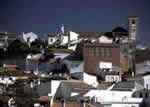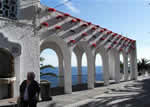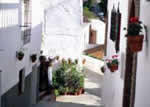
Maria Kupers from the Competa Town Hall talks us through the Spanish Municipal election process.
On the 27th May municipal elections will be held around the country which will ultimately decide the Mayor and the Councillors representing local villages and towns.
The amount of councillors is proportional to the amount of people on the electoral register. This is why it is so key to register yourself as this will mean more councillors for your area. For example in the village of Cómpeta there are to be 11 Councillors including the Mayor, although due to the amount of unregistered eligible foreigners this should in actual fact be more.
I spoke with Maria Kupers who gave me a brief lesson in Spanish local politics. Maria works for the current Mayor in the village of Cómpeta, Leovigildo López and was voted in as part Leovigildo's team. She has done a lot of work with regard to tourism and culture, setting up the Voz de Cómpeta newsletter, and has worked with the foreigners within the village.
Leovigildo is not running for re-election for Mayor in Cómpeta, and so Maria's role may well be up for negotiation with the new administration. However, Maria explained she is now part of the team for Jose Garcia Avila (better known as Paco from Axarquia Real Estate) and is number 3 in Paco's line-up.
Maria went on to tell me each party running for election has to have the same number of people in the party as the number of councillor positions available for the area. For example, Cómpeta is allowed 11 councillors thus each party must have 11 people on their list running for election. The Mayor is counted as number 1 and the higher up a person is on the list, the more important they are.
The amount of votes cast to each party is important as well as who wins, due to the proportional representation method used. The more votes a party gets, the more people on their list get in as council. For example, in Cómpeta, if a party gets 60% of the votes, they will have the Mayor plus the people selected as 2, 3, 4 and 5 on the list sitting as council in the Town Hall. The remaining 5 positions will be divided between the other parties depending on the votes cast.
When voting you should consider the entire list of candidates; you may like the last 3 people on the list and the first; but in reality the last 3 people (unless a walkover is achieved) are unlikely to be sitting as council even if the party wins. So voters should be looking not only at who is running for Mayor, but at the party as a whole.
Cómpeta has recently come into the headlines as the former local priest is running for election. Although popular with the community for his active roles in the local festivities he faces stiff opposition from Jose Garcia (Independent), Pepe Mayano (PSOE) and Antonio Navas (Independent). Voting takes place on the 27th of May and the change of government occurs on the 16th June.
 |



















